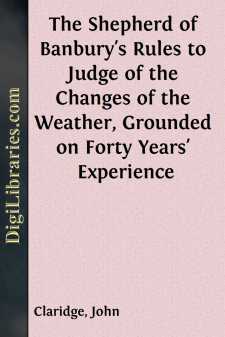Categories
- Antiques & Collectibles 13
- Architecture 36
- Art 48
- Bibles 22
- Biography & Autobiography 813
- Body, Mind & Spirit 142
- Business & Economics 28
- Children's Books 17
- Children's Fiction 14
- Computers 4
- Cooking 94
- Crafts & Hobbies 4
- Drama 346
- Education 46
- Family & Relationships 57
- Fiction 11829
- Games 19
- Gardening 17
- Health & Fitness 34
- History 1377
- House & Home 1
- Humor 147
- Juvenile Fiction 1873
- Juvenile Nonfiction 202
- Language Arts & Disciplines 88
- Law 16
- Literary Collections 686
- Literary Criticism 179
- Mathematics 13
- Medical 41
- Music 40
- Nature 179
- Non-Classifiable 1768
- Performing Arts 7
- Periodicals 1453
- Philosophy 64
- Photography 2
- Poetry 896
- Political Science 203
- Psychology 42
- Reference 154
- Religion 513
- Science 126
- Self-Help 84
- Social Science 81
- Sports & Recreation 34
- Study Aids 3
- Technology & Engineering 59
- Transportation 23
- Travel 463
- True Crime 29
The Shepherd of Banbury's Rules to Judge of the Changes of the Weather, Grounded on Forty Years' Experience
by: John Claridge
Categories:
Description:
Excerpt
INTRODUCTION.
AS we very justly esteem it a fit Tribute of Admiration to adorn natural Curiosities, by setting them as richly and as advantageously as art can direct, so the following Observations of the Shepherd of Banbury have appeared to me worthy of being presented to the Eye of the Public, with all the Lustre that it was in my Power to give them. It is one thing to observe, and another to reason upon Observations, and it very rarely happens that both can be taken into the Compass of one Man's Life. We ought therefore to consider it as a very lucky Incident, when the Observations of another Man, upon whom we can depend, fall into our Hands, and enable us to add natural Experience to the Notions derived to us from Books of Philosophy.
THERE is a Degree of Pedantry in Desarts as well as Colleges. Men who derive their Knowledge entirely from Experience are apt to despise what they call Book Learning, and Men of great Reading are as apt to fall into a less excusable mistake, that of taking the Knowledge of Words for the Knowledge of Things; whereas there are not any two points more opposite in Nature, since we very rarely see, that either true Scholars are talkative, or that talkative Men are true Scholars.
THE Shepherd, whose sole Business it is to observe what has a Reference to the Flock under his Care, who spends all his Days and many of his Nights in the open Air, and under the wide spread Canopy of Heaven, is in a Manner obliged to take particular Notice of the Alterations of the Weather, and when once he comes to take a Pleasure in making such Observations, it is amazing how great a Progress he makes in them, and to how great a Certainty at last he arrives by mere dint of comparing Signs and Events, and correcting one Remark by another. Every thing in Time becomes to him a Sort of Weather-Gage. The Sun, the Moon, the Stars, the Clouds, the Winds, the Mists, the Trees, the Flowers, the Herbs, and almost every Animal with which he is acquainted. All these I say become to such a person Instruments of real Knowledge.
THERE are a Sort of half wise People, who from the Consideration of the Distances of Things, are apt to treat such Prognostications, as they phrase them, with much Contempt. They can see no Connexion between a Cat's washing her Face, and the Sky's being overspread with Clouds, and therefore they boldly pronounce that the one has no Relation to the other. Yet the same People will readily own that the fluttering of the Flame of a Candle is a certain token of Wind, which however is not discernible by their Feeling; because it lies within the Compass of their Understanding to discern that this Fluctuation of the Flame is caused by the Wind acting upon it, and therefore they are inclined to believe this, though it does not fall actually under the Cognizance of their Senses. But a Man of a larger Compass of Knowledge, who is acquainted with the Nature and Qualities of the Air, and knows what an Effect any Alterations in the Weight, the Dryness, or the Humidity of it has upon all animal Bodies, easily perceives the Reason why other Animals are much sooner sensible of any Alterations that happen in that Element than Men, and therefore to him the cawing of Ravens, the chattering of Swallows, and a Cat's washing her Face are not superstitious Signs, but natural tokens (like that of the Candle's fluttering) of a Change of Weather, and as such they have been thought worthy of Notice by Aristotle, Virgil, Pliny, and all the wisest and gravest Writers of Antiquity....


